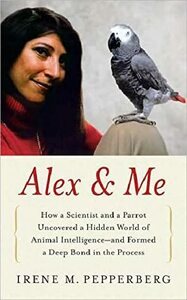Take a photo of a barcode or cover
A wonderful short book for anyone who has a pet or is an animal lover. Pepperberg's research over many decades into animal cognition and language, with the African Grey parrot named Alex, reveals how complex animals really are and how little we know about them. Her actual research was written about in more depth in her book, The Alex Studies, but this book is more autobiographical and details the relationship she shared with this amazing bird. I love the part in the book when she describes the lessons that Alex taught her and in particular, "Alex taught us that we are part of nature, not apart from nature...humans are not unique, as we long believed. We are not superior to all other beings in nature."
A great and amazing story, but just an ok book. I loved learning about Alex and all he had learned and what an amazing bird he was, but as far as a good book to sit down and read this isn't it. If you have even a little interest in this subject you'll find this very interesting, however if you don't really care about animal communication I doubt you'll enjoy this book. i felt like the time periods went by at varying speeds which was a little weird, and I felt it jumped from idea to idea. I think the book could've been organized better becasue sometimes things came out of nowhere. I love the story of Alex but I wish this book had been composed differently so others who may not have a strong interest will still enjoy this book!
My nano has led me to places I had no idea even existed. I heard Irene Pepperberg on The Moth which is a not-for-profit storytelling organization. I just discovered The Moth and I have enjoyed all the stories I have heard.
Pepperberg caught my attention because of the emotional content of her story. After listening, I wanted to know more about Alex and Irene. So off to the library catalog to request the book.
Because I was responding to the emotions of Pepperberg's story on The Moth, this book was not quite what I wanted. It is an excellent factual telling of Alex's life and work. I am not sorry I read the book - I had fun learning lots about parrots. I just wanted to know more about Irene's relationship with Alex and that was not the reason for the book.
I would recommend this to folks who enjoy about reading about the research about speech being done with animals.
Pepperberg caught my attention because of the emotional content of her story. After listening, I wanted to know more about Alex and Irene. So off to the library catalog to request the book.
Because I was responding to the emotions of Pepperberg's story on The Moth, this book was not quite what I wanted. It is an excellent factual telling of Alex's life and work. I am not sorry I read the book - I had fun learning lots about parrots. I just wanted to know more about Irene's relationship with Alex and that was not the reason for the book.
I would recommend this to folks who enjoy about reading about the research about speech being done with animals.
2.5
Ugh.
Okay. I got this book from my African Grey's previous owners, and prior to adopting my fabulous featherbutt, I had heard about Alex and Irene Pepperberg. I really had high hopes for this book. Seriously.
But really the entire thing went THUNK. Resoundingly.
The book started with talking about Alex's death and how Irene finally was allowing herself to feel emotions related to Alex that she didn't permit herself to feel when he was alive. As the daughter and sister of two PhD level scientists, I understand that as a scientist Irene felt she had to remain objective (because if not, well, don't many parents think their child is the smartest, the brightest, the best? The same could have occurred with Alex -- or at least be hinted at, if Irene had permitted herself to obviously become emotionally attached to Alex, then her objectivity and integrity as a scientist would've been called into question).
But I still don't think the book should've started out with Alex's death and the discussion about his obituaries and related stuff. It seemed so out of place.
I also understand that Pepperberg felt she needed to prove herself in the world of science, because in the 60s and 70s, women weren't really in the scientific field much at all. But her need to prove herself as a "real scientist" who was studying something that was "actually important" was over the top in this book and did become off-putting.
Also, she includes some journal entries from her time spent working with Alex. One of them is "Alex is being incredibly stupid today!" I was reading other reviews of the book, and this was brought up as -- why didn't she view it more as animals have moods too, and that if an animal is misbehaving it's more the fault of the trainer than the animal. But the thing is -- you have to remember that the studies in animal behavior have increased in leaps and bounds in the past 15-20 years. During most of the time Irene was working with Alex, people did think that animals were just operating on instinct and little more, and that there weren't specific languages with which animals communicated to each other (from a linguistic perspective -- rather it was thought that they functioned as automatons, controlled by hormones and other "natural" means of influencing behavior). And also, honestly? I think Irene edited out some of her journal entries. I'm kind of suspecting that there was more in that entry (the "Alex is being incredibly stupid today!" one, as well as others) that included more information and possibly stronger language than "stupid." But that might just be me. :)
Anyway, I wanted to read more about Alex, and less about Irene. Alex should've been the star of this book, but he wasn't, not really, and that makes me sad. Also, the last chapter finished with him dying, and she took him to have an autopsy done... and we never find out what killed him 20 years prematurely. I WANNA KNOW! (And granted, I could Google it, but it's something the book should have included...)
I'd like to read a book by Pepperberg now, that some years have passed since Alex's death, to see if she'd write any differently.
Ugh.
Okay. I got this book from my African Grey's previous owners, and prior to adopting my fabulous featherbutt, I had heard about Alex and Irene Pepperberg. I really had high hopes for this book. Seriously.
But really the entire thing went THUNK. Resoundingly.
The book started with talking about Alex's death and how Irene finally was allowing herself to feel emotions related to Alex that she didn't permit herself to feel when he was alive. As the daughter and sister of two PhD level scientists, I understand that as a scientist Irene felt she had to remain objective (because if not, well, don't many parents think their child is the smartest, the brightest, the best? The same could have occurred with Alex -- or at least be hinted at, if Irene had permitted herself to obviously become emotionally attached to Alex, then her objectivity and integrity as a scientist would've been called into question).
But I still don't think the book should've started out with Alex's death and the discussion about his obituaries and related stuff. It seemed so out of place.
I also understand that Pepperberg felt she needed to prove herself in the world of science, because in the 60s and 70s, women weren't really in the scientific field much at all. But her need to prove herself as a "real scientist" who was studying something that was "actually important" was over the top in this book and did become off-putting.
Also, she includes some journal entries from her time spent working with Alex. One of them is "Alex is being incredibly stupid today!" I was reading other reviews of the book, and this was brought up as -- why didn't she view it more as animals have moods too, and that if an animal is misbehaving it's more the fault of the trainer than the animal. But the thing is -- you have to remember that the studies in animal behavior have increased in leaps and bounds in the past 15-20 years. During most of the time Irene was working with Alex, people did think that animals were just operating on instinct and little more, and that there weren't specific languages with which animals communicated to each other (from a linguistic perspective -- rather it was thought that they functioned as automatons, controlled by hormones and other "natural" means of influencing behavior). And also, honestly? I think Irene edited out some of her journal entries. I'm kind of suspecting that there was more in that entry (the "Alex is being incredibly stupid today!" one, as well as others) that included more information and possibly stronger language than "stupid." But that might just be me. :)
Anyway, I wanted to read more about Alex, and less about Irene. Alex should've been the star of this book, but he wasn't, not really, and that makes me sad. Also, the last chapter finished with him dying, and she took him to have an autopsy done... and we never find out what killed him 20 years prematurely. I WANNA KNOW! (And granted, I could Google it, but it's something the book should have included...)
I'd like to read a book by Pepperberg now, that some years have passed since Alex's death, to see if she'd write any differently.
The story of Alex is so inspiring and amazing. I was so excited to read about the intellectual capabilities of birds. I felt like it ended a little abruptly, though.
Book #56 Read in 2018
Alex and Me by Irene Pepperberg
This book details the work that a scientist did with an African Grey parrot. Alex was able to speak, identify colors and shapes, add etc. It showed that even a bird and scientist could share a strong bond. I read this book on my Kindle.
Alex and Me by Irene Pepperberg
This book details the work that a scientist did with an African Grey parrot. Alex was able to speak, identify colors and shapes, add etc. It showed that even a bird and scientist could share a strong bond. I read this book on my Kindle.
I saw Alex on TV many years ago and fell head-over-heels in love. He was so personable and smart and adorable!
While I wasn’t wild about Irene Pepperberg’s writing style and found her to be not quite as likeable in the book as she is in television interviews, the story of how she taught Alex and helped to reveal the incredible intelligence of these birds was still wonderful. And it’s an important book for anyone who cares about animal protection and animal rights. As Dr Pepperberg notes: “…a vast world of animal cognition exists out there, not just in African Grey parrots, but in other creatures, too [...:] Clearly animals know more than we think, and think a great deal more than we know.”
It’s hard to imagine that anyone could read this book and come away thinking that we have the right to use animals as we please.
While I wasn’t wild about Irene Pepperberg’s writing style and found her to be not quite as likeable in the book as she is in television interviews, the story of how she taught Alex and helped to reveal the incredible intelligence of these birds was still wonderful. And it’s an important book for anyone who cares about animal protection and animal rights. As Dr Pepperberg notes: “…a vast world of animal cognition exists out there, not just in African Grey parrots, but in other creatures, too [...:] Clearly animals know more than we think, and think a great deal more than we know.”
It’s hard to imagine that anyone could read this book and come away thinking that we have the right to use animals as we please.
emotional
funny
informative
lighthearted
fast-paced
emotional
funny
informative
lighthearted
medium-paced






